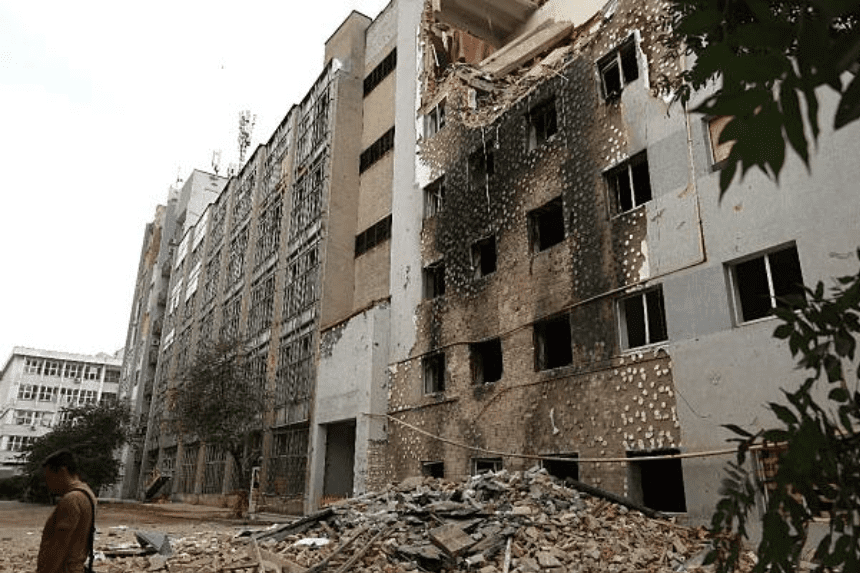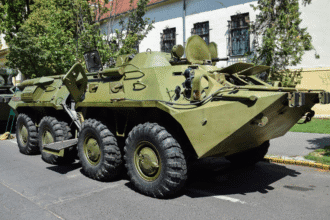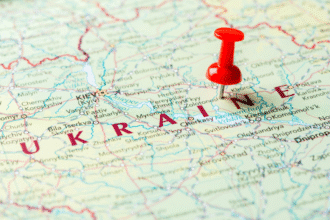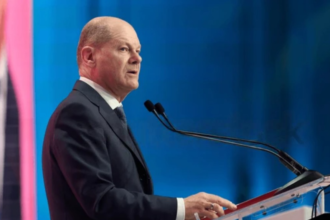Russia unleashed a powerful wave of airstrikes targeting several districts across Ukraine in one of the biggest attacks since early July. 577 of the 614 drones and missiles that were fired overnight were intercepted by the Ukrainian Air Force, according to Ukrainian authorities. By spreading bombardments beyond front-line zones into western territory, this represents a serious escalation in the continuing conflict between Russia and Ukraine.
The Lviv region was hit by strikes, resulting in the death of one civilian and damage to multiple buildings, including a nursery. 15 people were hurt when rockets hit a U.S.-owned electronics business in the Transcarpathia area, which is close to Ukraine’s borders with Hungary and Slovakia. These extensive airstrikes show how Russia is now extending its aerial attacks well into the west of Ukraine.
What Were the Airstrikes’ Primary Targets?
Both industrial and civilian infrastructure were targeted by the attacks. More than 20 structures in Lviv were damaged, including early education facilities and residential residences. A missile struck an American consumer electronics manufacturing facility in Mukachevo, causing major injuries and disrupting operations. Successful counterattacks were also reported by Ukrainian officials, who said that a drone depot in occupied Donetsk and an oil refinery in Russia’s Rostov region had been damaged.
Hypersonic, ballistic, and cruise missiles were among the weaponry used in the assault. The majority of the attacks came from Russian-occupied Crimea, the Black Sea, and western Russia. Here is the link to our article on Ukraine-Russia Drones
Does Diplomacy Still Have a Chance?
Diplomatic talks are receiving more attention as the violence intensifies. Volodymyr Zelensky, the president of Ukraine, reaffirmed his willingness to engage in peace negotiations with Vladimir Putin of Russia. Switzerland and Austria have been suggested as neutral venues for these discussions, but Istanbul is still a suitable substitute.
However, citing political concerns with Hungary, Zelensky excluded Budapest. According to Ukrainian authorities, Moscow has not yet demonstrated a sincere desire to engage in substantive talks, raising doubts about the likelihood of engagement in the near future.
What Is America’s Reaction?
The United States is still providing Ukraine with military and diplomatic support. High-level discussions between world leaders in Washington, D.C., have been part of recent diplomatic efforts to rekindle peace initiatives. Although the original plan called for trilateral negotiations in which the United States would participate, there are now signs that the United States may back off and permit direct communication between Russia and Ukraine—provided Moscow consents.
Andrii Sybiha, the foreign minister of Ukraine, emphasized that the recent attacks highlight the pressing necessity for more robust international defense assistance. He reiterated appeals for NATO members and other international partners to implement cutting-edge air defense systems. Here is the link to our article on Russian Airstrikes Kill.
What is the actual situation?
Russia is allegedly moving soldiers, even though front-line positions haven’t moved much in recent months. According to Ukrainian military sources, troops are being moved from the Kursk region to Zaporizhzhia, one of the areas Russia claims in its 2022 annexations. With only slight changes in geographical control, the ground battle is still at a standstill.
Russia’s stepped-up aerial assault continues to target critical infrastructure and cities located far from the combat, increasing the vulnerability of civilian areas despite the front being quiet.
Final Thoughts
The Russia-Ukraine conflict has reached a critical stage with a recent surge in airstrikes. The scale and intensity of attacks have increased dramatically, with over 600 aerial weapons deployed in a single night. Ukraine is intensifying efforts to secure foreign aid, especially air defense systems, to protect its cities and people as military actions escalate and diplomatic talks remain uncertain. The Russia-Ukraine conflict is putting growing pressure on the international community to act swiftly and prevent further deterioration. Continued escalation in this Russia-Ukraine conflict demands urgent global attention to avoid a deeper crisis. Ultimately, resolving the Russia-Ukraine conflict will require coordinated diplomatic and defense strategies to ensure stability.








